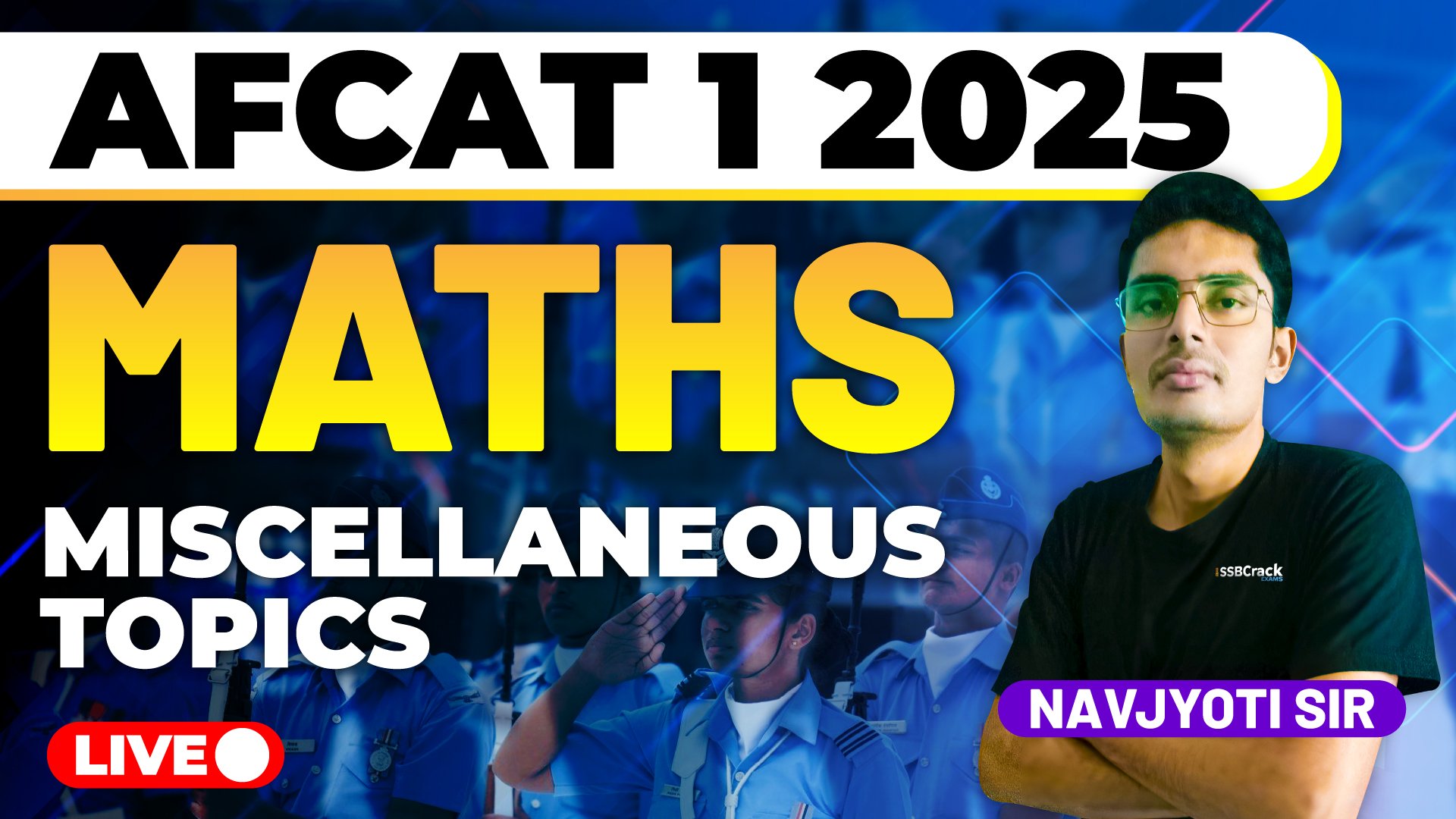In preparation for the AFCAT Maths section, a recent class focused on strengthening fundamental topics through rigorous practice of MCQs. These topics—Decimals and Fractions, Speed, Distance, and Time, along with Clocks—are crucial for scoring well in numerical ability, as they frequently appear in the exam. In this blog, we’ll dive into each topic discussed in the class, highlighting important concepts and sharing preparation strategies to boost your AFCAT score.
Key Topics Covered in Class
Decimals and Fractions
- Understanding and Conversions: Decimals and fractions are foundational for numerical reasoning. A strong grasp of converting fractions to decimals and vice versa, comparing values, and simplifying expressions is essential, as questions in the AFCAT often test these skills.
- Operations: Addition, subtraction, multiplication, and division of decimals and fractions are also tested, with emphasis on speed and accuracy. The ability to handle these operations quickly can help streamline complex problems, especially when fractions are embedded in larger calculations.
- Practice with MCQs: The class practiced several MCQs based on decimals and fractions, helping to reinforce concepts like decimal place values and simplification methods.
Speed, Distance, and Time
- Core Concepts: Problems involving speed, distance, and time are popular in competitive exams, given their real-life applications. Topics include calculating travel time, determining speed, and adjusting for changes in either speed or time.
- Average Speed and Relative Speed: Understanding average speed, especially in cases with varying speeds over different distances, is crucial. Relative speed, particularly in scenarios where two objects move towards or away from each other, adds an additional layer of complexity, often seen in AFCAT questions.
- Boats and Streams: Questions related to boats moving upstream and downstream are also common. These problems are based on the concepts of effective speed, requiring candidates to identify when to add or subtract the speed of the stream.
- Practical Application through MCQs: In the class, various MCQs covered these aspects, giving students practice with real exam-type questions. This allowed them to test their understanding and apply formulas effectively in a time-bound environment.
Clocks
- Angle Calculation: Clocks may seem like an unusual topic, but they provide numerous questions that test conceptual thinking. AFCAT questions on clocks usually revolve around calculating the angle between the minute and hour hands. Familiarity with how many degrees each hand moves per minute or hour is essential for accuracy.
- Coinciding Hands: Knowing how often the hands of a clock coincide, and at what times, is another common area of focus. These questions require an understanding of relative motion and can be practiced through sample MCQs.
- Practical Scenarios: Questions often involve calculating times when the hands form specific angles or coincide. The class explored these scenarios through MCQs, strengthening students’ speed and accuracy.
Essential Strategies for Preparing Decimals, Fractions, Speed-Distance-Time, and Clocks
Practice Consistently with MCQs
- Consistent practice of MCQs on decimals, fractions, speed-distance-time, and clocks is vital. This not only builds familiarity with question formats but also hones calculation speed, which is key in exams like AFCAT. Consider creating a timed practice schedule to simulate exam conditions.
Understand Key Concepts Without Memorization
- In AFCAT Maths, understanding concepts rather than relying on rote memorization helps with adaptability in problem-solving. For example, rather than memorizing exact steps for calculating relative speed, focus on understanding why speeds are added or subtracted. This way, you can handle various question types more intuitively.
Work on Speed and Accuracy
- Numerical ability tests are not just about solving questions correctly but doing so within a short timeframe. Practice mental math, quick conversions between decimals and fractions, and shortcuts for basic operations. For example, get comfortable with converting recurring decimals to fractions and vice versa, as these tricks can save valuable seconds during the exam.
Focus on Real-Life Applications for Speed and Distance
- Understanding speed, distance, and time in practical, real-world terms (such as cars on highways or boats in rivers) can make it easier to visualize and solve problems. Look at each problem as a real-world scenario, and practice applying formulas to practical questions to get accustomed to the types of questions that appear in AFCAT exams.
Draw Diagrams for Clock Problems
- For clock-based questions, drawing the clock face and positioning the hour and minute hands can make it easier to visualize angles and calculate the time difference. This technique is particularly useful when solving angle-related questions and helps ensure accuracy.
Review Previous Exam Papers
- Solving past AFCAT question papers reveals the typical patterns and difficulties level of questions. Focus on solving previous MCQs specifically from decimals, fractions, speed-distance-time, and clocks to get a clear picture of the kind of questions that appear and to test your preparedness.
Use Shortcuts Wisely
- For frequently appearing question types, especially in speed-distance-time, shortcuts can be extremely useful. Familiarize yourself with commonly used shortcuts and apply them wherever relevant. However, make sure you understand the logic behind each shortcut to avoid confusion during the exam.
Utilize Online Resources and Mock Tests
- Online resources, tutorials, and mock tests provide a wealth of practice questions. Set a target for the number of questions to practice daily or weekly in each topic, and use mock tests to gauge your speed and accuracy. This will help you become exam-ready and more comfortable with answering questions under time constraints.
Conclusion
Preparing for AFCAT’s numerical ability section requires consistent practice, solid understanding, and efficient problem-solving techniques. Topics like Decimals and Fractions, Speed, Distance, and Time, and Clocks are fundamental areas that form the foundation of many quantitative problems. Mastering these topics, as emphasized in the recent class, will significantly improve your performance in the exam.
By focusing on understanding concepts, practicing diligently with MCQs, and familiarizing yourself with exam patterns through previous question papers, you can enhance both your speed and accuracy. Ultimately, a strategic approach to preparing for these topics, backed by regular practice, will ensure you are well-equipped to tackle the AFCAT exam confidently and effectively.







